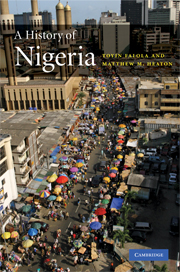Book contents
- Frontmatter
- Contents
- List of illustrations
- List of maps
- Acknowledgments
- Chronology
- Notable people in Nigerian history
- List of abbreviations
- Glossary
- Map 1 Major cities and ethnic groups in present-day Nigeria
- Introduction
- 1 Early states and societies, 9000 BCE – 1500 CE
- 2 Slavery, state, and society, c. 1500 – c. 1800
- 3 Political and economic transformations in the nineteenth century
- 4 Transition to British colonial rule, 1850 – 1903
- 5 Colonial society to 1929
- 6 Nationalist movements and independence, 1929 – 1960
- 7 Instability and civil war, 1960 – 1970
- 8 Oil, state, and society, 1970 – 1983
- 9 Civil society and democratic transition, 1984 – 2007
- 10 Nigeria and Nigerians in world history
- Concluding remarks: corruption, anti-corruption, and the 2007 elections
- Notes
- Selected bibliography
- Index
6 - Nationalist movements and independence, 1929 – 1960
Published online by Cambridge University Press: 05 June 2012
- Frontmatter
- Contents
- List of illustrations
- List of maps
- Acknowledgments
- Chronology
- Notable people in Nigerian history
- List of abbreviations
- Glossary
- Map 1 Major cities and ethnic groups in present-day Nigeria
- Introduction
- 1 Early states and societies, 9000 BCE – 1500 CE
- 2 Slavery, state, and society, c. 1500 – c. 1800
- 3 Political and economic transformations in the nineteenth century
- 4 Transition to British colonial rule, 1850 – 1903
- 5 Colonial society to 1929
- 6 Nationalist movements and independence, 1929 – 1960
- 7 Instability and civil war, 1960 – 1970
- 8 Oil, state, and society, 1970 – 1983
- 9 Civil society and democratic transition, 1984 – 2007
- 10 Nigeria and Nigerians in world history
- Concluding remarks: corruption, anti-corruption, and the 2007 elections
- Notes
- Selected bibliography
- Index
Summary
INTRODUCTION
The first three decades of the twentieth century saw the establishment and entrenchment of British colonial administration in Nigeria. Along with colonial rule came transformations to Nigerian economies and societies. While the colonial system brought some material benefits to a few European-educated intellectuals, by and large it alienated and frustrated most Nigerians, who believed that colonial rule eroded traditional cultures and institutions. Colonial rule also exploited Nigerian labor, both manual and intellectual, in a way that profited European firms far more than Nigerians themselves. Colonial rule had inspired anti-colonial resistance from the very beginning, although it had not organized around a pan-Nigerian consciousness, instead making appeals to race consciousness on the one hand and local circumstances on the other.
This early resistance to colonial rule soon, however, mushroomed into full-scale nationalist movements. Beginning in the 1930s a new generation of anti-colonial activists emerged in Nigeria, calling for greater involvement of Nigerians in the governance of Nigeria. Led by charismatic visionaries and dominated by the ever-growing class of European-educated Nigerians, the new nationalist movements placed increasing pressure on the colonial government to embark on progressive development planning measures, particularly after the Second World War. Increased spending on infrastructure, education, and health facilities made the colonial government more responsive to the needs of average Nigerians. Meanwhile, pressure from nationalist groups led to constitutional reforms in the years after the Second World War – reforms that increased Nigerian self-governance at the regional level and ultimately resulted in complete independence for Nigeria from British rule, achieved on October 1, 1960.
- Type
- Chapter
- Information
- A History of Nigeria , pp. 136 - 157Publisher: Cambridge University PressPrint publication year: 2008



